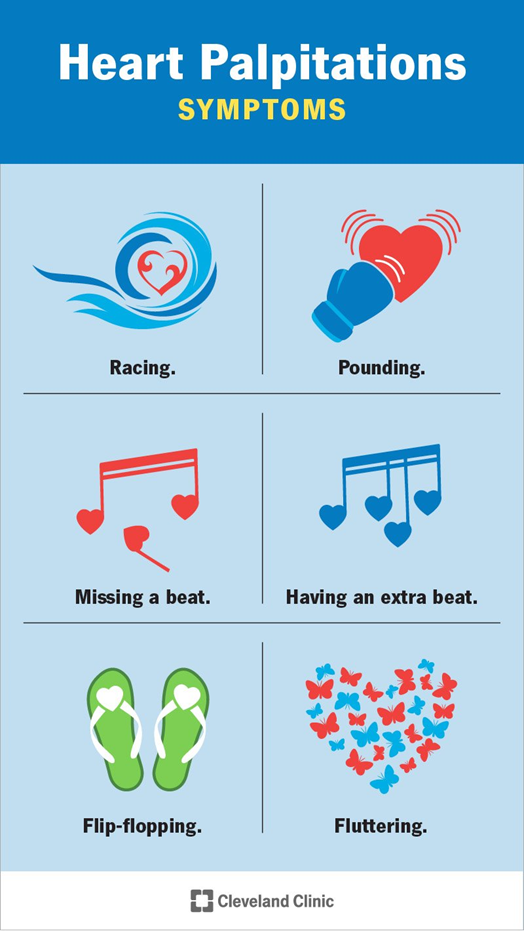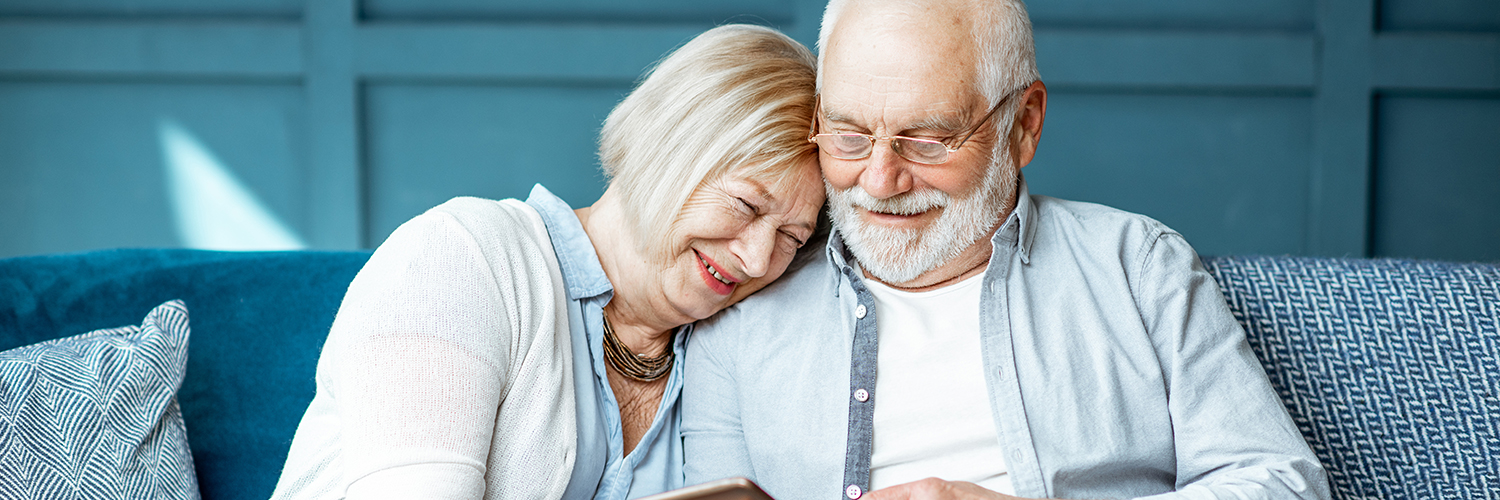PALPITATIONS
What are heart palpitations?
Heart palpitations are a feeling like your heart is missing heartbeats, racing or pounding. You can feel palpitations in your chest, throat or neck.
Palpitations can happen at any time, even if you’re resting or doing normal activities. Although they may be startling, palpitations usually aren’t serious or harmful. However, they can sometimes be related to an abnormal heart rhythm that needs medical attention.
Who does it affect?
Heart palpitations are more common in women and people assigned female at birth, but anyone can experience them.
People can get heart palpitations at different times in their lives. You can get them as a teenager, during pregnancy or during menopause, for example.
How common are heart palpitations?
Heart palpitations are common. One study found that 16% of people saw their primary care provider because they had palpitations. Also, heart palpitations are one of the most common reasons people visit a cardiologist.
What are the symptoms of heart palpitations?
Heart palpitations symptoms may feel like your heart is:
- Racing.
- Pounding.
- Missing a beat.
- Having an extra beat.
- Flip-flopping.
- Fluttering.
You can feel heart palpitations in your chest, as well as in your neck or throat.
Symptoms of palpitations are more likely to be related to an abnormal heart rhythm if you have:
- Heart disease.
- Significant risk factors for heart disease.
- An abnormal heart valve.
How long do heart palpitations last?
Heart palpitations usually don’t last long. They usually last a few seconds or minutes, but they sometimes last longer.
What causes heart palpitations?
A wide variety of things can cause heart palpitations, including but not limited to:
- Emotions, such as anxiety, stress, fear and panic.
- Exercise.
- Pregnancy.
- Caffeine.
- Overactive thyroid.
- Low levels of sugar, potassium or oxygen.
- Low carbon dioxide in your blood.
- Fever.
- Anemia.
- Dehydration.
- Blood loss.
- Medications such as asthma inhalers, beta blockers you take for high blood pressure or heart disease, thyroid drugs and antiarrhythmic medicines.
- Some cough/cold medicines, including decongestants.
- Some herbal and nutritional supplements.
- Recreational drug use such as cocaine and amphetamines (speed).
- Nicotine.
- Alcohol.
When do people get palpitations?
You can get heart palpitations at different times in your life. Some people experience:
- Heart palpitations with anxiety. Heart palpitations can be part of your body’s reaction to feelings of anxiety or panic.
- Heart palpitations after eating. Spicy or rich foods can cause palpitations, and so can caffeinated drinks or alcohol.
- Heart palpitations at night. These are just like daytime palpitations, but you may notice them more at night because you’re not busy or distracted.
- Heart palpitations when lying down. Sleeping on your side may increase pressure in your body, which can cause palpitations.
- Heart palpitations all day. If you’re having heart palpitations all day, check with your healthcare provider. Most heart palpitations don’t last long.
- Heart palpitations during pregnancy. When you’re pregnant, your heart rate and the amount of blood circulating in your body increase to support your baby. It’s common for pregnant people to have heart palpitations, and they’re usually harmless. You can ask your provider for a medication that’s safe to take during pregnancy.
How are heart palpitations diagnosed?
A healthcare provider will listen to your heart and lungs. They’ll also review your:
- Medical history.
- Symptoms.
- Diet.
- Medications and herbal products you take.
It’s helpful to let a provider know the details of your heart palpitations, such as:
- When and how often they happen.
- How long they last.
- How you feel when they happen.
- What you’re doing when they start.
- What helps you feel better.
You may not have heart palpitations during your visit with a provider. They may ask you to tap your fingers to imitate the rhythm of your palpitations.
What tests will be done to diagnose heart palpitations?
A provider may order tests, such as:
- Blood tests.
- Urine (pee) tests.
- Electrocardiogram (ECG/EKG).
- Stress test.
- Echocardiogram (heart ultrasound).
- A Holter monitor you wear for a day or longer to record your heart’s activity.
- Electrophysiology study.
- Cardiac catheterization.
You may need to see an electrophysiologist. This is a provider who specializes in abnormal heart rhythms.
How are heart palpitations treated?
The best type of treatment for you depends on what causes your heart palpitations. You may not need any treatment.
If you have heart disease or an abnormal heart rhythm, you may need medication, a procedure, surgery or a device to correct the problem. It’s important to keep all follow-up appointments with your provider.
How can I stop heart palpitations?
If anxiety or stress causes your heart palpitations, you may be able to control them with calming activities like yoga, meditation or a mindfulness exercise that focuses on your breathing. In addition, you may need to drink less coffee or other caffeinated drinks if caffeine triggers palpitations.
Will heart palpitations go away?
Heart palpitations often go away without medical treatment if things you eat, drink or do cause them, including:
- Smoking.
- Drinking alcohol.
- Drinking caffeinated beverages.
- Eating spicy or rich food.
- Working out too hard.
However, if you have heart disease or an abnormal heart rhythm, you may need medication, a procedure, surgery or a device to correct the issue. Again, it’s important to keep all follow-up appointments with your provider.
How can I prevent heart palpitations?
Depending on what’s causing your heart palpitations, these tips can help you have them less often:
- Reduce your stress level with deep-breathing and/or relaxation exercises, yoga, tai chi, guided imagery or biofeedback techniques.
- Avoid or limit the amount of alcohol you drink.
- Avoid or limit the amount of caffeine in your diet.
- Don’t use tobacco or nicotine products.
- Exercise on a regular basis. Before you start, ask your healthcare provider what exercise programs are right for you.
- Avoid foods and activities that trigger palpitations.
- Control your blood pressure and cholesterol levels.
What can I expect if I have heart palpitations?
Heart palpitations usually aren’t a cause for concern. People who have them can go about their normal lives.
Are heart palpitations dangerous?
No, heart palpitations usually aren’t dangerous.
Are heart palpitations normal?
Heart palpitations are very common and are usually a normal response to stress or anxiety.
When should I see a healthcare provider?
Call 999 (or your local emergency number) right away if heart palpitations won’t stop or if you have these symptoms:
- Passing out.
- More intense pain, pressure or tightness in your chest, neck, jaw, arm(s) or upper back.
- Trouble breathing.
Contact your provider if you have palpitations sometimes, but don’t have the additional symptoms below. If your palpitations get worse or suddenly happen more often, call your provider.
When should I worry about heart palpitations?
Heart palpitations usually aren’t dangerous. However, they may be a sign of a more serious health problem if you also:
- Feel dizzy, confused or lightheaded.
- Have chest pain or pressure.
- Have shortness of breath.
- Have unusual sweating.
- Start to have worse palpitations or have them more often.
What questions should I ask my doctor?
Questions you can ask your provider include:
- What’s causing my heart palpitations?
- Do I need treatment for my heart palpitations?
- How long will I have heart palpitations?
Heart palpitations (feeling like your heart is racing or pounding) can be unsettling because you usually aren’t aware of your heartbeat. But heart palpitations are usually harmless. If you have other symptoms like dizziness or passing out when you have heart palpitations, that could be a sign of a serious medical problem. In that case, you should tell a healthcare provider about it.
Dr Ubaid works well with all the staff. His approach to his fellow workers is both patient and respectful. His easy going manner makes him very approachable to ask advice and he accommodates any delays graciously. I personally look forward to working with him.
In life we all need role models, if I was in training to be a doctor you would certainly fit that role for me. I thank you so much for what you have done to allow me to continue with my fitness regime and wish you well in the life ahead of you.
Your kindness and good humour were very much appreciated and certainly put me at ease throughout the procedure, which on other ocassions has been quite daunting, your relaxed approach to my problem was very calm and professional.
In Dr Salahaddin Ubaid I had a medical genius who also contributed significantly to aiding me overcome all of the negative worries and emotions I was feeling. The care he provided to me, his attention to detail, his personal knowledge, expertise, experience and skills was outstanding.
A great team player, all of the nursing staff are very happy to work with Salahaddin as he is polite, efficient, and has a great aura of calmness and competence and appreciates the time to be light-hearted.
His presence radiates a warmth, he instils confidence in all those around him, he sets an example for others to follow and is a role model for others to aspire to be like. He was kind, courteous, professional, understanding, caring and highly approachable and relatable as well as the medical guru we all benefit from and rely on to give us our lives back.
What I valued as much as his erudition was his people skills, he related to everyone as an individual, his understanding, communications, interactions and personable nature were exceptional. Dr Ubaid was quite simply staggering, he is somebody that has had a significant impact on me, not just for giving me my life back and for his medical genius but for being the person that he is.







